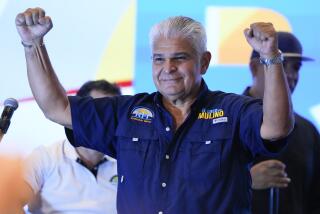Panama’s Catholic Bishops Call on Noriega to Resign
- Share via
PANAMA CITY — Thousands of Panamanians chanted, applauded, sang and wept Sunday in support of the Roman Catholic Church’s emergence as a leader in the struggle to force Gen. Manuel A. Noriega from power.
In Masses throughout the country, priests and ordinary church-goers read a pastoral letter signed by all 10 of Panama’s bishops attacking Noriega for trying to steal last week’s presidential election--first through massive fraud, then by nullifying the vote--and for violently assaulting his political opposition.
In wealthy churches with organs and choirs and in modest chapels where a single guitarist accompanied hymns, the clergy condemned Noriega for “violating the popular will” by refusing to accept the apparent overwhelming election victory of the Democratic Alliance for Civic Opposition.
“What moral justification can be made for firing bullets and beating men and women whose only crime was to peacefully demand their rights?” the bishops’ letter asked. “What moral justification can be made for terrifying the hungry masses with a hateful and false nationalism that neither respects nor recognizes the rights and safety of the rest of the Panamanians?”
In demanding that Noriega turn over power to the opposition “in recognition of the will of the people” as expressed in the elections, the bishops said that “not to do so would be a sin of conscience.”
The pastoral letter was especially critical of the Noriega regime for ordering paramilitary and security forces to attack opposition leaders last Wednesday, when Democratic Alliance leaders Guillermo Endara, Ricardo Arias Calderon and Guillermo (Billy) Ford were beaten so badly they had to be hospitalized.
The strongly worded condemnation of the military regime marked a turning point for the church in Panama, a country that is 94% Catholic.
Until this year, the church was largely noted for its caution and reluctance to criticize Noriega, let alone call for his removal from power.
Most Priests Are Foreigners
Apart from a historical conservatism, reasons for the low profile include the makeup of the clergy. About 75% of the country’s estimated 330 priests are foreigners. Required to renew their visas every two months, “priests feel pressure and constant threat,” according to Father Fernando Guardia, a leader of the anti-Noriega clergy.
But this year, as official corruption and Noriega’s abuse of power, including a growing intimidation of the clergy, increased, the church began speaking and acting against the military regime.
Priests spoke out against the government’s failure to investigate crimes allegedly committed by military officers and other government officials, and then last month the church announced that because of concern over the honesty of the presidential election, it planned to conduct its own independent count of the votes.
Actually, it was that count that helped convince diplomats and international observers that Noriega’s candidate had been swamped in the election and that his government’s claim of victory was a fraud.
But with the emergence of the church as a power against the regime, some priests are worried that the political leaders are not keeping up with the dissatisfaction of the people nor applying enough pressure to force Noriega out.
“The opposition has opted for a political solution,” said one important priest, “but what kind of solution can you get from a dictator?”
Lack of Nerve
The comment mirrors assessments from many diplomats and observers that the opposition and its followers have never shown the stomach or nerve to overturn someone as determined to keep power as Noriega.
“As soon as Noriega made a threat of force, whether he used it or not, the opposition generally folded,” said one diplomat. “No one expects them to get killed, but waving handkerchiefs, milling around and then going home as soon as troops show up won’t get them power.”
Even with the singing, the chants and the cheers, Sunday’s show of support for the Democratic Alliance never really got out of the pews and into the streets.
With Endara, the opposition presidential candidate, still under medical treatment, Ford and Arias Calderon, who were the opposition’s vice presidential candidates, attended several Masses separately but then got together at the Church of Christ the King to hear Msgr. Javier Villanueva read the pastoral letter.
The thousand or more people who filled the church to overflowing applauded constantly, chanted “Justice! Justice!” and waved the white handkerchiefs that have become the symbol of the opposition, then sang “The Battle Hymn of the Republic” in Spanish.
After the noon Mass, Ford said the reading of the pastoral letter “gives me faith that things will get better.”
More to Read
Sign up for Essential California
The most important California stories and recommendations in your inbox every morning.
You may occasionally receive promotional content from the Los Angeles Times.













